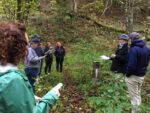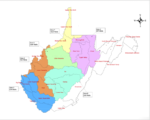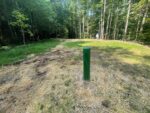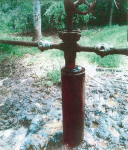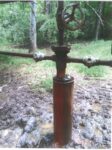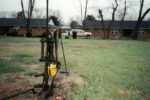- Like
- Digg
- Del
- Tumblr
- VKontakte
- Buffer
- Love This
- Odnoklassniki
- Meneame
- Blogger
- Amazon
- Yahoo Mail
- Gmail
- AOL
- Newsvine
- HackerNews
- Evernote
- MySpace
- Mail.ru
- Viadeo
- Line
- Comments
- Yummly
- SMS
- Viber
- Telegram
- Subscribe
- Skype
- Facebook Messenger
- Kakao
- LiveJournal
- Yammer
- Edgar
- Fintel
- Mix
- Instapaper
- Copy Link
In this issue:
- WV-SORO’s take on Forced Pooling and Its Fate
- Legislature Amends Aboveground Storage Take Act
- Environmental Quality Board Rules in Injection Well Appeal; Hearing Planned on New Permits
The position of WV-SORO has always been that it is not realistic legally or politically to believe that we can stop the shale gas drilling. As a result we have been in favor of well spacing (and resulting royalty sharing) legislation that would require drillers to space wells responsibly (and share the royalties from each well among all of the mineral owners being drained by a well) in order to lessen the problems with the “rule of capture.” This process that would be created by legislation is sometimes called “forced pooling and unitization” (or in industry jargon, “lease integration” or “fair pooling”). (Note that “voluntary” pooling and unitization provisions are in most leases these days and a mineral owner should get experienced legal advice before signing such a lease.)
WV-SORO has been in favor of good forced pooling legislation because it would to some degree decrease the number of well pads and other surface disturbance (and because it would help get the gas out of the ground more efficiently by preventing over-drilling and by preventing waste of isolated “stranded” acreage). Forced well spacing and royalty sharing legislation is complicated and politically difficult, but potentially fairer to almost everyone involved.
Here is our one page explanation of what should be in a “good” forced pooling bill.
All the bills introduced by the industry before the 2015 Legislative session have been terrible and we have opposed them.
HB 2688, which was introduced during the 2015 Legislative session, was the result of “stakeholder” meetings initiated by the new House Energy Committee chairman Woody Ireland (R-Ritchie) to which WV-SORO was invited and in which we participated. The other stakeholders included two industry groups, the Independent Oil and Gas Association of WV (IOGA) and the WV Oil and Natural Gas Association (WVONGA); three royalty owner organizations (the WV Royalty Owners Association, the National Association of Royalty Owners, and the WV Land and Mineral Owners Association), and the WV Farm Bureau. The final product was NOT an “agreed to” bill. Instead it was drafted by the sponsoring legislators to try to give enough benefits to each of the interested stakeholders to get them to support it.
While HB 2688 was far from what such a bill should have been, it had several important provisions for surface owners. First, it provided that the surface above a forced mineral tract could NOT be used for a well pad or other disturbance. Second, it included a process by which surface owners could eventually come to own the unknown or unlocatable mineral interests under their surface, at least of the formation being unitized. (And this would mean that the surface owner might be able to get some of the royalties as well.) Third, until a surface owner could get through the court process necessary to take ownership of the minerals (and royalties), the royalties would have gone to the Abandoned Well Fund to plug some of the many orphaned wells scattered across the state on surface owners’ land. As a result, we agreed to support HB 2688 conceptually with the right to make amendments to clarify the intent of the sponsoring legislators.
As HB 2688 worked its way through the Legislature, we successfully planted one amendment which solidified the intent of the sponsors that no well pad or other surface disturbance could be placed on the surface above a mineral tract that was forced into a unit under the new statute. For the 30% of our members who own their minerals, we also were also successful in planting an amendment to make sure that when the Commission that decides the amounts of the royalties, bonuses etc. to be given to a mineral owner who is forced to lease in a unit, the Commission can consider more than just leases to others in the immediate vicinity. Mineral owner organizations fought hard and successfully for a “no deduction” royalties provision for mineral owners. We were disappointed that mineral owner organizations did not fight harder for better versions of and protections for nearby by minerals owners who could be affected (correlative rights) and some of the more sophisticated compensation provisions.
In the end, HB 2688 died on a tied 49 to 49 vote in the House of Delegates on the last night of the session! It had made it through the House of Delegates previously on a 60 to 40 vote. It then passed the Senate by a comfortable margin of 24 to 10 on the last day of the session. However, the bill had been amended in the Senate and needed to pass the House again before becoming the law. The self-proclaimed “Liberty Caucus” continued to raise lots of anti-government and, usually mistaken, “takings” arguments. In addition some members of the House of Delegates who had voted for it the first time were under additional pressure from folks back home. And finally, we heard there was also some raw political maneuvering that affected some votes. This combination of factors resulted in the bill no longer having the support from a majority of delegates which was needed for the bill to pass.
We would have had mixed feelings if the bill passed. We wanted more protections for both surface owners and mineral owners than what was included in the bill. But we also have mixed feelings that it failed, as we might have been able to build on what was in the bill in future years.
Our hope is that if the bill comes back again, which we expect that it will (read more here and here), that we can get more surface owner provisions included, and that its proponents will try to get a comfortable majority of legislators to support it by moving the balance of the bill more toward the mineral owners and away from industry.
Another part of our message to legislators throughout the stakeholder process and in public hearings regarding the forced pooling bill was that if they were going to pass forced pooling for the industry, they also need to implement the recommendations of the Horizontal Well Act studies to help surface owners. These recommendations include measuring the minimum distance that well work could be from homes from the “limit of disturbance” (edge of the well pad), rather than from the center of the well pad. The following are additional recommendations from researchers at WVU that should be adopted with regard to noise, dust, and other air emissions from horizontal drilling sites:
• Fence-line monitoring for these parameters
• Measurable emission standards for these parameters that can be adjusted using Best Available Control Technology (BACT)
• Short and long-term health studies of citizens living near Marcellus wells
We still need implementation of these study recommendations. In addition we would also want legislation that would reverse the trend of split estates and give surface owners a chance to own the minerals beneath their land. Our bill granting preference to surface owners at mineral tax sales cleared one committee (the House Energy Committee) for the first time this year but was not taken up by the House Judiciary Committee where it was also assigned.
Legislature Amends Aboveground Storage Tank Act
We alerted you a couple of time during the session about efforts to weaken the Aboveground Storage Tank Act, which was passed unanimously last year in the wake of the Freedom Industries chemical leak.
Throughout the session, WV-SORO worked with our allies in the environmental community to improve the bill that seemed destined to pass this Legislature. Our ad-hoc coalition was successful in garnering support for a couple amendments that that increased the frequency of DEP’s required inspections of Level 1 tanks from every 5 years to every 3 and strengthened requirements regarding tank owners’ responsibility to share information with water utilities. Unfortunately, another amendment that would have tightened up a potential loophole for tanks to be determined in compliance with the Act under weaker standards was not adopted.
Thank you to all who made your voice heard through emails, calls, and/or visits to the Capitol and opposed these rollbacks with us. Your voices made a difference. The bills that were introduced at the beginning of the session were much worse than the bill that finally passed. Sometimes victory means defending against an even worse defeat.
For more details, check out the Charleston Gazette’s coverage of the House debate here, and a story from WV Public Broadcasting outlining rollback concerns here.
Environmental Quality Board Rules in Injection Well Appeal; Hearing Planned on New Permits
Last year WV-SORO joined the Natural Resources Defense Council (NRDC), the Plateau Action Network (PAN) and local landowners in asking the state to shut down a problem waste disposal site in Fayette County, which has a history of violations. On Wednesday, the WV Environmental Quality Board (EQB) ruled that the Department of Environmental Protection (DEP) violated the law by allowing the Danny Webb Construction to operate the well without a permit. In it’s decision, the EQB has given the DEP 30 days to reissue a permit for the site or cease operations (read more here and here).
Although the decision is positive in requiring DEP to follow the law requiring operators of these sites to have permits, the EQB entirely ignored our arguments about the risks the site poses to water quality, and the health and safety of community. Danny Webb Construction has applied for permit renewals and a public hearing is schedule for later this month (more details and background below). Area residents are concerned about the continued operation of the well and are circulating a petition to halt the issuance of new permits for the site. You can support their efforts by signing the petition here.
Public Hearing, Tuesday, April 21, 2015 at 6PM
The West Virginia Department of Environmental Protection (DEP) is proposing to issue two new permits to Danny Webb Construction Inc. to operate two oil and gas wastewater injection wells at the North Hill site in Lochgelly. The waste operation has been the site of numerous serious violations in past years.
DEP will be holding a public hearing to allow members of the public to comment on the proposed permits on Thursday, April 21, 2015. The hearing will be held at the Oak Hill High School auditorium at 350 West Oyler Avenue, Oak Hill, West Virginia. The hearing will occur from 6PM to 8PM. Members of the public will likely have 3-5 minutes to speak, but can take less time.
Other opportunities to weigh in by mail, fax, or e-mail:
You can also send written comments to DEP by mail or by e-mail. All comments are due by May 1. They can be as brief or as long as you like.
Fax: 304-926-0452, Attn: Justin Nottingham
Email: Justin.e.nottingham@wv.gov, Subject: UIC comments
Mail: WV DEP, Office of Oil and Gas, Attn: Justin Nottingham, 601 57th Street SE, Charleston, WV, 25304
Background:
Danny Webb Construction Inc. was first issued a permit at the Lochgelly site in 2002. The site has two underground injection wells that are used to dispose of oil and gas wastewater. The site also has two surface pits that are no longer taking new waste and have been filled in. Complaints about foul odors began in 2004. Other complaints since then have included soil contamination around the pits and contamination of the stream that runs next to the site and flows into Wolf Creek. Although DEP has issued violation notices to the operator, there is no evidence that all of the state’s orders have been complied with.
In 2007, many local residents opposed renewing the permit for the site. Nevertheless, a permit was issued. In 2008, DEP found more violations at the site but continued to allow the facility to operate. More violations were issued in 2010. The last permit expired in 2012, but DEP has allowed the company to continue operating the waste site. Now DEP is proposing to issue new permits for the two injection wells.
Environmental concerns:
The stream adjacent to the site is a tributary of Wolf Creek, which flows into the New River. Water testing of the stream by Duke University scientists in 2014 found elevated levels of chloride, bromide, sodium, manganese, strontium, and barium. This chemical composition is typical of oil and gas wastewater found in West Virginia. DEP has not determined the source of the stream contamination. Past water testing of the stream found high levels of contaminants including diesel, oil, chloride, and iron. Lab testing of soil collected from private property adjacent to the site in 2013 detected Total Petroleum Hydrocarbons and acetone.
Suggested topics for oral or written comments:
• Proximity: If you live near the Danny Webb Construction site or near Wolf Creek, or if you are affected by the air quality, water quality or truck traffic in the area, mention that in your comments.
• Truck traffic: DEP has not analyzed the risks to health and safety from any increased truck traffic at the site. The new permit would allow much more waste to be disposed at this site, and the waste is transported by large trucks. This heavy traffic is dangerous, generates harmful air pollution, is very noisy, and destroys rural roads. This traffic could be 24/7. The roads are not designed for increased heavy industrial truck traffic, and the risk of serious traffic accidents could escalate at all times of the day and night. The level of traffic is not appropriate for the rural nature of the area and the community may not have the capacity to deal with major accidents involving hazardous materials.
• Water contamination: DEP has not determined if the injection wells are causing any ground water or surface water contamination. DEP must determine the source of contamination in the stream before issuing any new permits. Recent testing by independent scientists from Duke University found high levels of contaminants in the stream that runs adjacent to the Danny Webb Construction waste site. The contamination matches oil and gas wastewater chemistry, but no one has determined if the contamination is from the pits or from the underground injection wells. No new permits should be issued for injection wells until it is certain that the injection wells are not causing any water contamination and all contamination has been resolved.
• Oil and gas wastewater is known to be toxic: Oil and gas exploration and production wastes have been shown to meet the criteria for hazardous waste and to contain toxic substances which endanger both human health and the environment, including materials that can cause cancer. They may contain volatile organic compounds, radioactive material, or heavy metals and should be treated with special precautions to ensure safe disposal. However, these materials are exempt from federal hazardous waste laws and, therefore, current state standards are not adequate to protect the public. A company managing these wastes should be held to the highest standards. This waste will be transported through the community on rural roads. The community may not have the capacity to deal with major accidents involving hazardous materials.
• History of violations at the site: Danny Webb Construction Inc. has a pattern of violations. The company has been issued numerous violation notices and orders since 2004. Many of them are for very serious offenses. There is no evidence that the company has complied with all of the previous orders. This is not the kind of company we want in our community. DEP should automatically reject any permit applications from companies with a pattern of noncompliance and require any operator applying for a permit to certify that it is currently in compliance with all safety and environmental requirements and that it has met all obligations for any prior violations.

